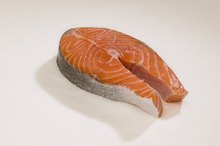Diet for Mononucleosis
The first symptoms of mononucleosis may appear as stomach problems, such as nausea, vomiting and diarrhea, which can make eating unappealing. Opt for small, frequent meals throughout the day to stave off digestive woes and keep your energy levels up. You’ll probably recover from mono within two to four weeks; however, the fatigue associated with this disease can last for many more weeks, according to the Centers for Disease Control and Prevention 2. Once you can stomach it, eat a diet rich in antioxidants, protein, healthy fats and whole grains to boost immunity and aid in your recovery.
Boost Your Immunity
The University of Maryland Medical Center recommends eating antioxidant-rich foods to bolster your immune system while recovering from mono 3. Antioxidants enhance your immune system by keeping each component working so the system can attack the virus 4. Grill asparagus for dinner, which contains glutathione. Bake kale in the oven and sprinkle with salt, or snack on nuts to get vitamin E and zinc. Make sweet potato fries or steamed carrots for dinner, or have peach or cantaloupe chunks with your lunch for carotenoids. Top salads with citrus fruits, bell peppers or raw broccoli for a dose of vitamin C.
- The University of Maryland Medical Center recommends eating antioxidant-rich foods to bolster your immune system while recovering from mono 3.
- Top salads with citrus fruits, bell peppers or raw broccoli for a dose of vitamin C.
Get a Dose of Healthy Fats
A Post Pancreatitis Diet
Learn More
Consume healthy fats to enhance your immunity and keep your cell membranes working well. Grill or broil fish for lunch or dinner. Fish contains omega-3 fatty acids, which help reduce inflammation. Top salads with nuts or seeds or toast them on the stove and toss them in with rice or pasta dishes. Mash avocado with garlic, lemon juice and salt for guacamole. The University of Maryland Medical Center recommends eliminating trans fats when recovering from mono 3. These fats are found in processed foods, margarine and store-bought baked goods.
- Consume healthy fats to enhance your immunity and keep your cell membranes working well.
- The University of Maryland Medical Center recommends eliminating trans fats when recovering from mono 3.
Fill Up on Fluids
Drink plenty of water to aid in your recovery. The University of Wisconsin-Madison Health Services advises consuming a minimum of 8 ounces of noncaffeinated and nonalcoholic drinks every two hours. Your body loses fluids when you have a fever, so drink more than usual until your fever subsides. Fluids have the added benefit of making a sore throat, a common symptom of mono, feel better.
- Drink plenty of water to aid in your recovery.
- Your body loses fluids when you have a fever, so drink more than usual until your fever subsides.
Lean In on Protein
How to Detox the Body After the Flu
Learn More
Incorporate high-quality, lean protein into every meal. Protein repairs cell damage and enhances your immune system. Eat fewer red meats and opt for tofu, beans, fish, chicken and eggs. You can keep your energy levels up by having small amounts of protein throughout the day because it will stabilize your blood sugar levels. Grill or broil a small piece of fish or chicken for lunch or dinner, snack on a hard-boiled egg or hummus and carrot sticks, or bake tofu until it's golden brown and eat it as is or as part of a sandwich or salad.
- Incorporate high-quality, lean protein into every meal.
- Eat fewer red meats and opt for tofu, beans, fish, chicken and eggs.
Opt for Whole Grains
Replace any refined carbohydrates, such as white breads, pastas and rice, with whole grains. Foods with a high glycemic index, like refined grains, promote inflammation, which can make your sore throat, muscle aches and fatigue even worse. Reduce your sugar intake from cookies, cereals and candy. Sugar may suppress your white blood cells, which are key players in your fight against mono.
- Replace any refined carbohydrates, such as white breads, pastas and rice, with whole grains.
- Foods with a high glycemic index, like refined grains, promote inflammation, which can make your sore throat, muscle aches and fatigue even worse.
Related Articles
References
- University of Portland: Health Center: Mononucleosis
- Centers for Disease Control and Prevention: About Infectious Mononucleosis
- University of Maryland Medical Center: Mononucleosis
- CNCA Health: Immune System Health and Support: The Importance of Antioxidants
- SelfGrowth.com: A Diet for Epstein Barr Virus
- Linus Pauling Institute: Inflammation
Writer Bio
Michelle Fisk began writing professionally in 2011. She has been published in the "Physician and Sports Medicine Journal." Her expertise lies in the fields of exercise physiology and nutrition. Fisk holds a Master of Science in kinesiology from Marywood University.









